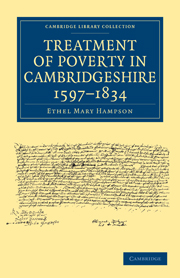Book contents
- Frontmatter
- Contents
- LIST OF ILLUSTRATIONS
- Preface
- EDITOR'S PREFACE
- CHAPTER I INTRODUCTORY: POOR RELIEF IN CAMBRIDGESHIRE BEFORE 1597
- CHAPTER II POOR RELIEF IN CAMBRIDGE DURING THE FIRST PART OF THE SEVENTEENTH CENTURY
- CHAPTER III POOR RELIEF IN WISBECH DURING THE FIRST PART OF THE SEVENTEENTH CENTURY
- CHAPTER IV POOR LAW ADMINISTRATION IN THE RURAL AREAS DURING THE FIRST PART OF THE SEVENTEENTH CENTURY
- CHAPTER V WAGE PROBLEMS. THE PROFITABLE EMPLOYMENT OF THE POOR. FIRST PHASE OF THE MOVEMENT
- CHAPTER VI HOUSING PROBLEMS AND PAUPER LABOUR IN CAMBRIDGESHIRE IN THE EARLY EIGHTEENTH CENTURY. THE ISLE OF ELY AND THE STATUTE OF 1723
- CHAPTER VII THE WORKHOUSE MOVEMENT IN THE TOWNS OF CAMBRIDGE AND ROYSTON, 1723–1785
- CHAPTER VIII THE WORKHOUSE MOVEMENT IN RURAL CAMBRIDGESHIRE, 1723–1785
- CHAPTER IX THE URBAN WORKHOUSES OF CAMBRIDGESHIRE, 1785–1834
- CHAPTER X THE RURAL WORKHOUSES OF CAMBRIDGESHIRE, 1785–1834. PARLIAMENTARY REPORTS OF 1804 AND 1834
- CHAPTER XI SETTLEMENT AND REMOVAL, 1660–1834
- CHAPTER XII PAUPER APPRENTICESHIP
- CHAPTER XIII BASTARDY
- CHAPTER XIV RELIEF OUTSIDE THE WORKHOUSE, 1660–1782
- CHAPTER XV RELIEF OUTSIDE THE WORKHOUSE, 1782–1834
- CHAPTER XVI CONSTITUTIONAL STRUCTURE AND SOCIAL POLICY
- CHAPTER XVII CONCLUSIONS
- APPENDIX
- MS. Sources and Bibliography
- Index of Names
- Index of Places
- Index of Special Subjects
- Plate section
CHAPTER XVII - CONCLUSIONS
Published online by Cambridge University Press: 07 September 2010
- Frontmatter
- Contents
- LIST OF ILLUSTRATIONS
- Preface
- EDITOR'S PREFACE
- CHAPTER I INTRODUCTORY: POOR RELIEF IN CAMBRIDGESHIRE BEFORE 1597
- CHAPTER II POOR RELIEF IN CAMBRIDGE DURING THE FIRST PART OF THE SEVENTEENTH CENTURY
- CHAPTER III POOR RELIEF IN WISBECH DURING THE FIRST PART OF THE SEVENTEENTH CENTURY
- CHAPTER IV POOR LAW ADMINISTRATION IN THE RURAL AREAS DURING THE FIRST PART OF THE SEVENTEENTH CENTURY
- CHAPTER V WAGE PROBLEMS. THE PROFITABLE EMPLOYMENT OF THE POOR. FIRST PHASE OF THE MOVEMENT
- CHAPTER VI HOUSING PROBLEMS AND PAUPER LABOUR IN CAMBRIDGESHIRE IN THE EARLY EIGHTEENTH CENTURY. THE ISLE OF ELY AND THE STATUTE OF 1723
- CHAPTER VII THE WORKHOUSE MOVEMENT IN THE TOWNS OF CAMBRIDGE AND ROYSTON, 1723–1785
- CHAPTER VIII THE WORKHOUSE MOVEMENT IN RURAL CAMBRIDGESHIRE, 1723–1785
- CHAPTER IX THE URBAN WORKHOUSES OF CAMBRIDGESHIRE, 1785–1834
- CHAPTER X THE RURAL WORKHOUSES OF CAMBRIDGESHIRE, 1785–1834. PARLIAMENTARY REPORTS OF 1804 AND 1834
- CHAPTER XI SETTLEMENT AND REMOVAL, 1660–1834
- CHAPTER XII PAUPER APPRENTICESHIP
- CHAPTER XIII BASTARDY
- CHAPTER XIV RELIEF OUTSIDE THE WORKHOUSE, 1660–1782
- CHAPTER XV RELIEF OUTSIDE THE WORKHOUSE, 1782–1834
- CHAPTER XVI CONSTITUTIONAL STRUCTURE AND SOCIAL POLICY
- CHAPTER XVII CONCLUSIONS
- APPENDIX
- MS. Sources and Bibliography
- Index of Names
- Index of Places
- Index of Special Subjects
- Plate section
Summary
Any attempt to define within accurate chronological limits the trends of thought or practice which developed in the long period during which the Elizabethan statute formed the basis of Poor Law administration is fraught with serious difficulty, for even within the confines of a single county contradictory policies repeatedly characterise places but a few miles apart. This is less true of the first forty years of the seventeenth century, during which time the administrative hierarchy, with the Privy Council at its head, made unflagging efforts to establish a centralised and uniform system, but in the course of the two succeeding centuries complete local autonomy resulted in the most varied administration—legal, extra-legal and illegal.
The explanation lies essentially in the isolated character of the very small communities with which we are essentially concerned. Communications were notoriously bad through the fenland county of Cambridge, yet it is in the marshy Isle of Ely rather than in the county proper that the influence of common impulses at various periods can more easily be traced. The more significant villages of the Isle were, in the main, situated on the drier ridges, and population tended to concentrate here, or in hamlets looking to the larger communities as centres. The successive series of experiments initiated by the enterprising little industrial town of Wisbech, bordering upon the East Anglian textile district, definitely gave the lead to the larger parishes of the Isle.
- Type
- Chapter
- Information
- Treatment of Poverty in Cambridgeshire, 1597–1834 , pp. 260 - 273Publisher: Cambridge University PressPrint publication year: 2009First published in: 1934



